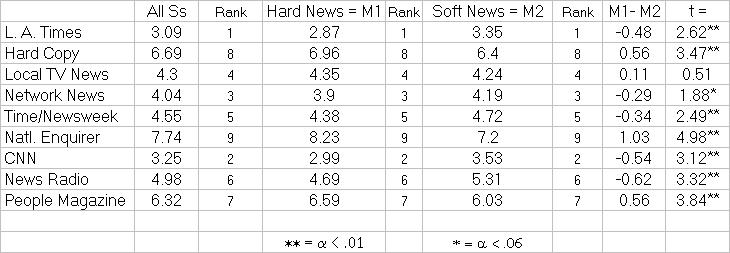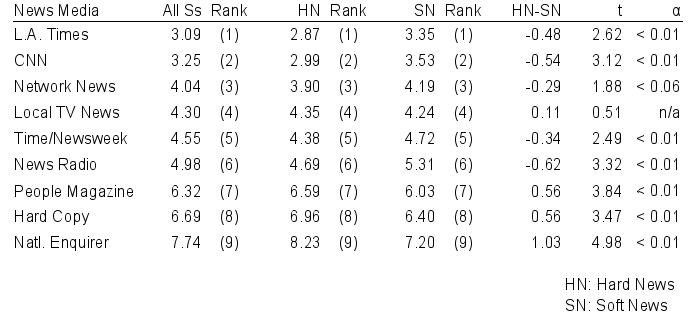Teaching:TUW - UE InfoVis WS 2008/09 - Gruppe 06 - Aufgabe 2: Difference between revisions
No edit summary |
(work in tutor's feedback) |
||
| Line 17: | Line 17: | ||
The columns have different widths which groups (and separates) the data. This seems not to be on purpose. | The columns have different widths which groups (and separates) the data. This seems not to be on purpose. | ||
The data rows are not sorted by any column. | The data rows are not sorted by any column. Readers will spend some time trying to understand, why the rows are printed in this order. Further, if readers wants to compare values, they can do it more efficiently, if rows are sorted by rank. | ||
=== Formatting Text === | === Formatting Text === | ||
| Line 41: | Line 41: | ||
=== Arranging Data === | === Arranging Data === | ||
By inserting whitespace we created three column groups for "All Ss", "Hard News", and "Soft News" to structure the data. | |||
Each of these groups contain a column for the value and a column for the rank. | Each of these groups contain a column for the value and a column for the rank. | ||
As said above, it is unclear whether the rank is redundant (and should kept only once) or describes three different rankings. We assumed the latter, thus kept all columns. | As said above, it is unclear whether the rank is redundant (and should kept only once) or describes three different rankings. We assumed the latter, thus kept all columns. | ||
Instead of "M1" and "M2" we used the variables "HN" and "SN". | Instead of "M1" and "M2" we used the variables "HN" and "SN". These akronyms are explained in the table notes. | ||
We reordered the data rows by rank. Since the three rankings could be as well different it would be also possible to order by the first column. | We reordered the data rows by rank. Since the three rankings could be as well different it would be also possible to order by the first column. | ||
To | To ease lookup of "α", we created an additional column. | ||
=== Formatting Text === | === Formatting Text === | ||
Revision as of 11:36, 15 December 2008
Aufgabenstellung
Zu beurteilende Tabelle
Critical Review
We reviewed the given table based on the table design guidelines by Few [2004] and found the following problems:
Delineating Columns and Rows
A grid is used to delineating columns and rows, which should be avoided.
Arranging Data
The table has multiple columns called "Rank", which contain the same data. We don't know if this is by coincidence, or redundancy.
The columns have different widths which groups (and separates) the data. This seems not to be on purpose.
The data rows are not sorted by any column. Readers will spend some time trying to understand, why the rows are printed in this order. Further, if readers wants to compare values, they can do it more efficiently, if rows are sorted by rank.
Formatting Text
All columns containing numbers are centered. Some numbers (e.g., 4.3) only have one digit right of the decimal point. Consequently these numbers are narrower than the other numbers in the column and are not well aligned.
Some of the columns (Rank) have a smaller font size. We compared the asterisk symbols and found out that three different font families are used.
The table contains footnotes.
Improved Table
Improvements
Delineating Columns and Rows
We removed the grid and slightly increased line height.
Rulers are used to seperate the header from the table-body.
Additional whitespace was added between the columns "All Ss" and "Hard News" to enforce the bond between "Hard News" and "Soft News". The same was done for "HN-SN", "t" and "α" resp.
Arranging Data
By inserting whitespace we created three column groups for "All Ss", "Hard News", and "Soft News" to structure the data. Each of these groups contain a column for the value and a column for the rank. As said above, it is unclear whether the rank is redundant (and should kept only once) or describes three different rankings. We assumed the latter, thus kept all columns.
Instead of "M1" and "M2" we used the variables "HN" and "SN". These akronyms are explained in the table notes.
We reordered the data rows by rank. Since the three rankings could be as well different it would be also possible to order by the first column.
To ease lookup of "α", we created an additional column.
Formatting Text
We used only one font family and one font size We applied the same number format and precision for all values to improve alignment.
Columns containing numbers are aligned to the right.
The resulting table can be browsed easily and looks good. Even if it's size would be downscaled by ~15%, the content would be comprehensible.
Links
References
- [Few, 2004] Stephen Few. Show Me the Numbers - Designing Tables and Graphs to Enlighten. Analytics Press, Oakland, CA, 2004.

